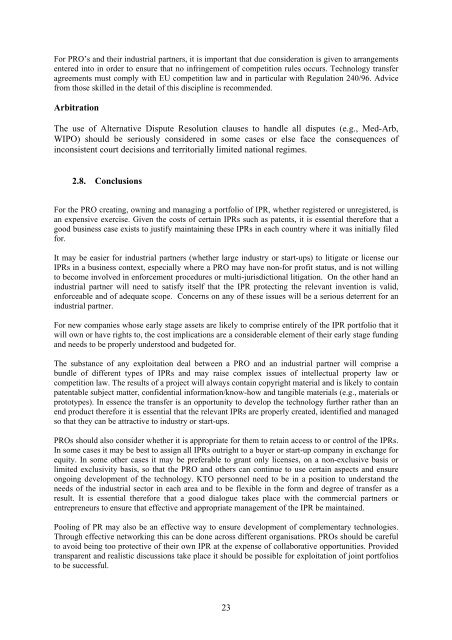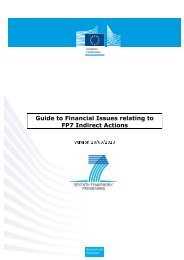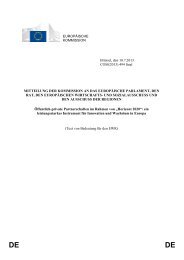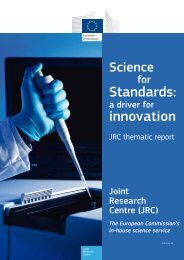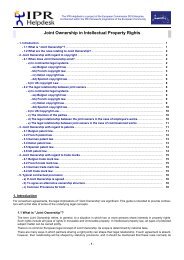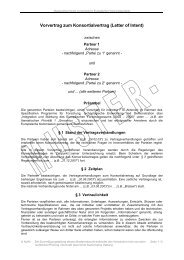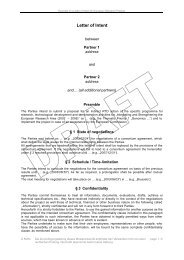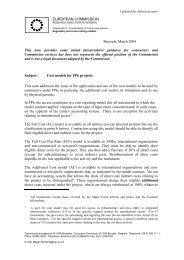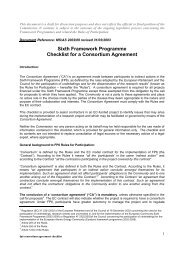Expert Group Report Management of Intellectual Property in ... - KoWi
Expert Group Report Management of Intellectual Property in ... - KoWi
Expert Group Report Management of Intellectual Property in ... - KoWi
Create successful ePaper yourself
Turn your PDF publications into a flip-book with our unique Google optimized e-Paper software.
For PRO’s and their <strong>in</strong>dustrial partners, it is important that due consideration is given to arrangements<br />
entered <strong>in</strong>to <strong>in</strong> order to ensure that no <strong>in</strong>fr<strong>in</strong>gement <strong>of</strong> competition rules occurs. Technology transfer<br />
agreements must comply with EU competition law and <strong>in</strong> particular with Regulation 240/96. Advice<br />
from those skilled <strong>in</strong> the detail <strong>of</strong> this discipl<strong>in</strong>e is recommended.<br />
Arbitration<br />
The use <strong>of</strong> Alternative Dispute Resolution clauses to handle all disputes (e.g., Med-Arb,<br />
WIPO) should be seriously considered <strong>in</strong> some cases or else face the consequences <strong>of</strong><br />
<strong>in</strong>consistent court decisions and territorially limited national regimes.<br />
2.8. Conclusions<br />
For the PRO creat<strong>in</strong>g, own<strong>in</strong>g and manag<strong>in</strong>g a portfolio <strong>of</strong> IPR, whether registered or unregistered, is<br />
an expensive exercise. Given the costs <strong>of</strong> certa<strong>in</strong> IPRs such as patents, it is essential therefore that a<br />
good bus<strong>in</strong>ess case exists to justify ma<strong>in</strong>ta<strong>in</strong><strong>in</strong>g these IPRs <strong>in</strong> each country where it was <strong>in</strong>itially filed<br />
for.<br />
It may be easier for <strong>in</strong>dustrial partners (whether large <strong>in</strong>dustry or start-ups) to litigate or license our<br />
IPRs <strong>in</strong> a bus<strong>in</strong>ess context, especially where a PRO may have non-for pr<strong>of</strong>it status, and is not will<strong>in</strong>g<br />
to become <strong>in</strong>volved <strong>in</strong> enforcement procedures or multi-jurisdictional litigation. On the other hand an<br />
<strong>in</strong>dustrial partner will need to satisfy itself that the IPR protect<strong>in</strong>g the relevant <strong>in</strong>vention is valid,<br />
enforceable and <strong>of</strong> adequate scope. Concerns on any <strong>of</strong> these issues will be a serious deterrent for an<br />
<strong>in</strong>dustrial partner.<br />
For new companies whose early stage assets are likely to comprise entirely <strong>of</strong> the IPR portfolio that it<br />
will own or have rights to, the cost implications are a considerable element <strong>of</strong> their early stage fund<strong>in</strong>g<br />
and needs to be properly understood and budgeted for.<br />
The substance <strong>of</strong> any exploitation deal between a PRO and an <strong>in</strong>dustrial partner will comprise a<br />
bundle <strong>of</strong> different types <strong>of</strong> IPRs and may raise complex issues <strong>of</strong> <strong>in</strong>tellectual property law or<br />
competition law. The results <strong>of</strong> a project will always conta<strong>in</strong> copyright material and is likely to conta<strong>in</strong><br />
patentable subject matter, confidential <strong>in</strong>formation/know-how and tangible materials (e.g., materials or<br />
prototypes). In essence the transfer is an opportunity to develop the technology further rather than an<br />
end product therefore it is essential that the relevant IPRs are properly created, identified and managed<br />
so that they can be attractive to <strong>in</strong>dustry or start-ups.<br />
PROs should also consider whether it is appropriate for them to reta<strong>in</strong> access to or control <strong>of</strong> the IPRs.<br />
In some cases it may be best to assign all IPRs outright to a buyer or start-up company <strong>in</strong> exchange for<br />
equity. In some other cases it may be preferable to grant only licenses, on a non-exclusive basis or<br />
limited exclusivity basis, so that the PRO and others can cont<strong>in</strong>ue to use certa<strong>in</strong> aspects and ensure<br />
ongo<strong>in</strong>g development <strong>of</strong> the technology. KTO personnel need to be <strong>in</strong> a position to understand the<br />
needs <strong>of</strong> the <strong>in</strong>dustrial sector <strong>in</strong> each area and to be flexible <strong>in</strong> the form and degree <strong>of</strong> transfer as a<br />
result. It is essential therefore that a good dialogue takes place with the commercial partners or<br />
entrepreneurs to ensure that effective and appropriate management <strong>of</strong> the IPR be ma<strong>in</strong>ta<strong>in</strong>ed.<br />
Pool<strong>in</strong>g <strong>of</strong> PR may also be an effective way to ensure development <strong>of</strong> complementary technologies.<br />
Through effective network<strong>in</strong>g this can be done across different organisations. PROs should be careful<br />
to avoid be<strong>in</strong>g too protective <strong>of</strong> their own IPR at the expense <strong>of</strong> collaborative opportunities. Provided<br />
transparent and realistic discussions take place it should be possible for exploitation <strong>of</strong> jo<strong>in</strong>t portfolios<br />
to be successful.<br />
23


